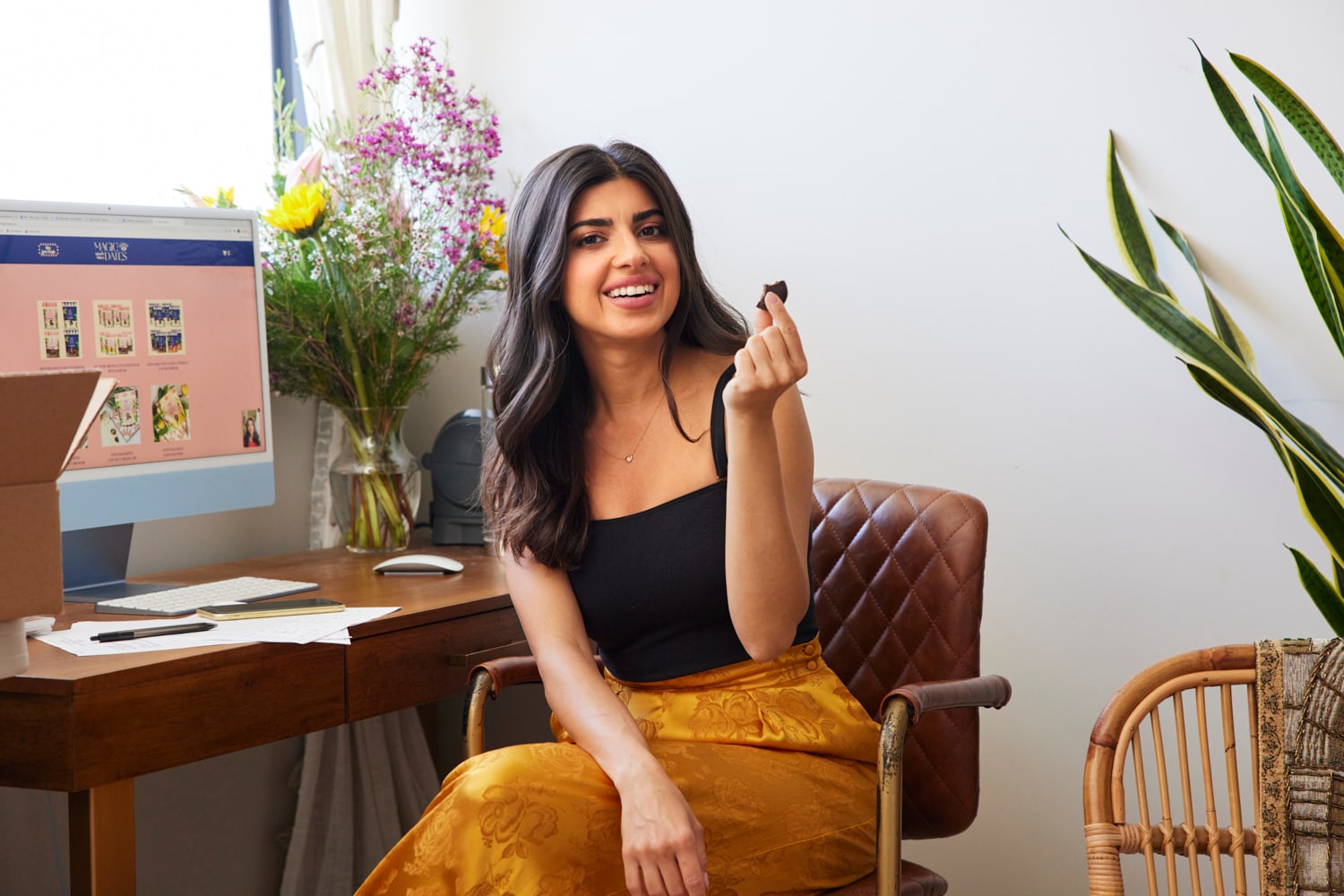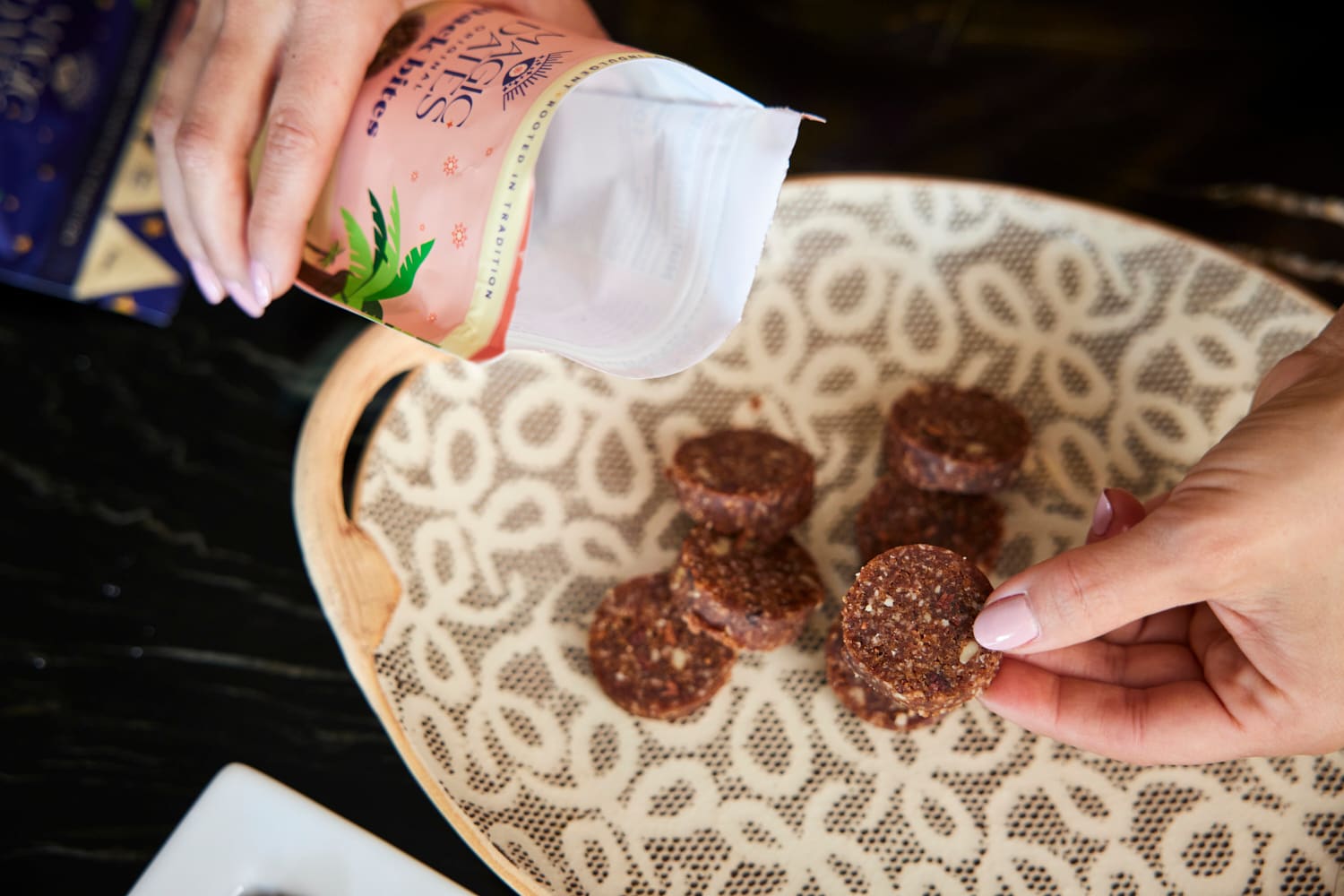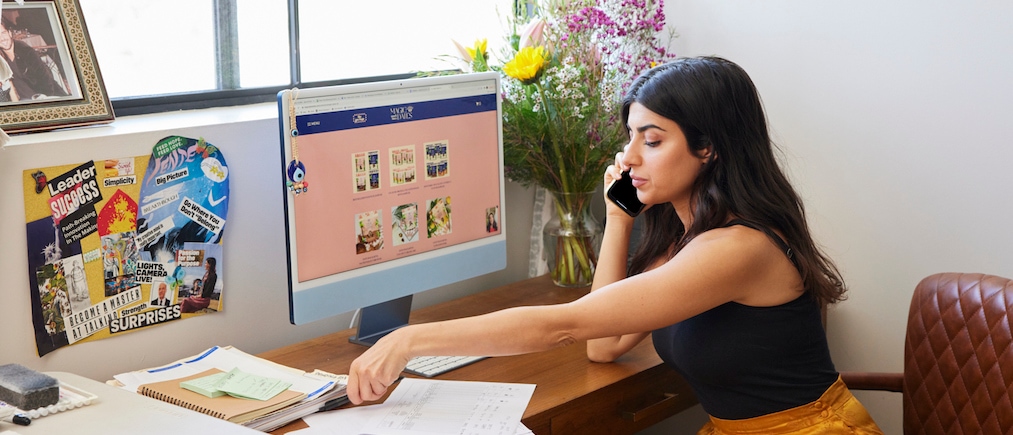We all have our favorite childhood snacks. The bag of chips mom or dad packed with lunch. An after-school candy bar. Those orange slices on the soccer field. Growing up in Damascus, Syria, Diana Jarrar's favorite was dates. For centuries, dates have been a signature sweet throughout the Middle East, but for the most part, haven't gotten the attention they deserve in the West.
Jarrar, who immigrated to the United States nearly 20 years ago by way of Canada, has set out to change that. She's the founder of MAGICDATES, a Los Angeles-based brand of better-for-you snacks centered around dates. With flavors like Coconut Cream Cake and Salted Walnut Brownie, as well as a chocolate-covered line, MAGICDATES can be found on the shelves of retailers nationwide as well as direct-to-consumer via the MAGICDATES site. Jarrar was also recently featured on Shark Tank, where she walked away with an investment deal. Impressive reach, given that Jarrar founded the company just a few years ago, almost by accident.
The daughter of a Syrian mother and Palestinian father, Jarrar arrived in LA at 19 and thought she was on track for law school. Because Jarrar’s a lifelong foodie, a friend asked if she could help him formulate a vegan ice cream sandwich he was trying to launch. That pro bono kitchen assistance opened her eyes to the food industry, which sparked the idea for a snack line with her beloved dates as the “hero ingredient” – a sweet pick-me-up without the baggage of refined sugar and other junk.
From there, she conducted market research and tested out a wide range of flavors, launched at farmers markets and independent retailers, and landed a spot at the Venture Accelerator at UCLA’s Anderson School of Management, which helped her pivot and grow throughout the pandemic.
The branding, packaging, and messaging are rooted in Jarrar’s Middle East heritage and she’s quick to describe food as a bridge-builder between cultures, which remains central to MAGICDATES’ story and mission.
For this first installment of "An American Experience” – a new series spotlighting immigrant entrepreneurs and their journeys – I sat down with Jarrar to learn more about launching a brand from the kitchen table, boosting online sales, and why we should all “run toward our differences.”
As entrepreneurs, we have such an opportunity to be advocates beyond our core products.
—Diana Jarrar, founder, MAGICDATES

Diana Jarrar, founder of MAGICDATES
So you could be writing legal briefs right now, instead of running a successful snack company. How was MAGICDATES born?
It was really funny. I didn't know I wanted to start a company. So it really was just born out of true inspiration. I wanted to go to law school right before starting MAGICDATES. I had taken the LSAT and I wanted to do the international human rights program at UCLA. I just wanted to contribute somehow to the betterment of the world through what I do, but I didn't exactly know how.
But after getting a taste—pun intended—of the food business while helping your friend, you realized that contribution could come through food.
I took a bit of a leap of faith, not really knowing what I was doing, not really having the background and the expertise, but I just trusted that I would figure it out. I chose dates because I grew up eating them, but it was a little more than that. There’s such a reverence for dates in the Middle East, both on a cultural level, on a religious level – even though I'm not religious myself, just the tradition of the religion, how we grew up eating them around Ramadan when we break our fast, it was just such a beautiful, exquisite time. And it's just always that staple item that you have on a table.
And the thing I love is that there’s a connecting thread between all the Eastern religions and dates. Judaism, Christianity, and Islam all share that. The date fruit palm is a tree of life. Not only are dates considered a source of so much energy, but the ferns are used for building structures. That's why it was considered a tree of life – because it gave both sustenance and shelter. I just found that to be very poetic and something we can learn from nature, how this fruit can connect us all and bring us together.
What makes MAGICDATES a better-for-you indulgence?
MAGICDATES is plant-based. It's gluten-free. There's no added sugar and no sugar alcohols, which is really important from a gut-health perspective. And just in general, for wellbeing, we're big advocates of enjoying sweet treats—as long as they're straight from nature without any added stuff in them.
What was an early sign you were onto something here?
I started at a local farmer's market, so it was super grassroots. From the beginning, right here in LA, I would go to a farmer's market every Sunday and I would hand-bag the bites and hand-sticker all the labels and would get feedback from customers. That's how I decided on the initial flavors that we launched with. It was based on what customers are responding to.

By interviewing her customers, Jarrar realized she wanted to take MAGICDATES back to her roots with a rebrand.
And it was really cool to get that first customer, I'll never forget. I actually have a picture of me handing her the bag in exchange for money. I'd never done that before. It was a really cool, empowering transaction, especially as a woman. I just loved that moment.
I don’t have to tell you that the consumer-products space – especially food and beverage – can be challenging. You’re dealing with manufacturers and packagers and retailers. And yet, you’re everywhere right now. How did you master that learning curve?
I wouldn't say I mastered it. It was definitely trial and error and Murphy’s Law – things are just going to go wrong because you just can't foresee what's going to happen.
What was the pandemic like for you and MAGICDATES? Every entrepreneur has their own war story at this point.
We had actually just launched at a key national retailers right before, which was going really well. But with the lockdowns, it was challenging. At the time, we weren’t really set up for direct-to-consumer (D2C) sales. We had a website, we had an online presence, but we weren't really investing resources in that. 2020 forced me to take a few steps back and reassess where we were at and what we were doing.
The biggest thing that came out of COVID for us was our rebrand. During the social justice movement, I was really inspired by people speaking up and standing for what they believe in, people from all across coming together and supporting each other. And I realized that I wasn't truly connecting to the origin story that I intended. I wanted MAGICDATES to be a vehicle of cultural connection and to reclaim the narrative of the Middle East. I wasn't doing that with our original branding that we had launched with. And so after interviewing more of our customers – just going back to what our customers are looking for – we decided that a new look was in the cards for us. We especially wanted to show up online more, and we needed to just show up with a different voice and a different look.
And in the process, you pushed a majority of sales online.
Historically, it was 80% brick-and-mortar and 20% online, but I wanted to shift things. Now we’re about 60% online and 40% in stores. We are focusing a lot more on D2C and digital retail, just because of the opportunity that's there. We implemented a digital marketing strategy and that's going well. Our cost of acquisition is actually really low, shockingly low. So we had a really good start out of the gate.
Sharing food can highlight our similarities and bridge our differences. Given that the idea for MAGICDATES was born out of your own childhood experience, what has its cultural impact meant for you?
That is exactly the intention for me with MAGICDATES. As entrepreneurs, we have such an opportunity to be advocates beyond our core products. And especially in food, because it's so emotional. We don’t always buy our food for logical reasons.
You’re well into both your immigrant and entrepreneurial journeys. What would be your advice to someone else who is embarking on their own? What would you tell your teenage self arriving in LA?
When I was applying to law school, I met with a counselor at UCLA, who shared a line I’ll never forget: “Run toward your differences.” I wish I took that more to heart at the time because that's exactly what makes us unique. From that, I think a lot is born. Whether it's a business idea or anything else. Really taking that time to introspect and figure out what makes you different, then work at something you become passionate about.
And for an immigrant, the answer may be a little bit easier, because just being an immigrant makes you different. What your unique story was, where you came from, what your beliefs are – and sharing that. I think the American public in general is very receptive to that, and as an immigrant, you become a part of that. That’s why I was excited to get on Shark Tank. I wanted to share my uniqueness, knowing that American hearts are huge. That's something my dad would always say: "There's nothing like American philanthropy. There's nothing like American giving." It's so true and continues to be true.
Diana's story is part of a series called An American Experience. Read more about how she pivoted her business or her recommendations for making your brand stand out.
Photos: Amanda Friedman




